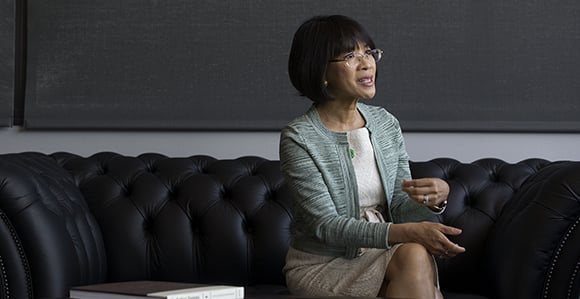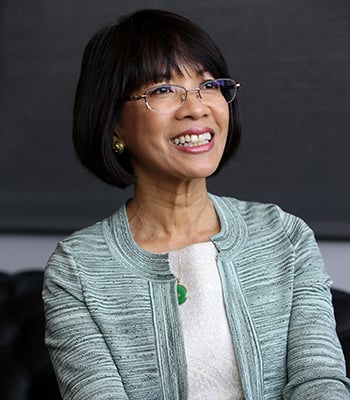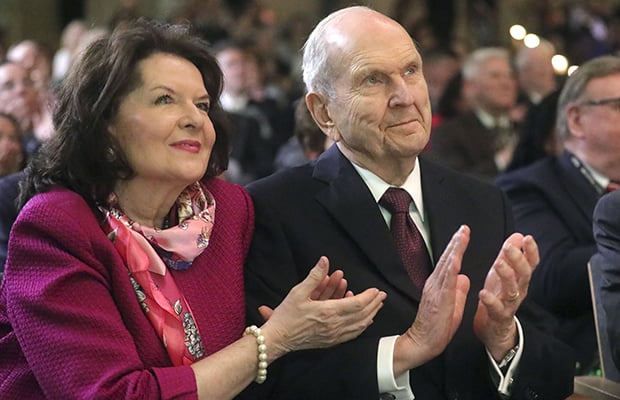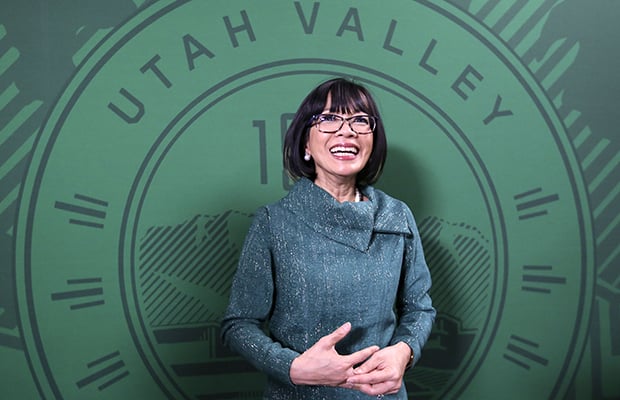How a Latter-day Saint Convert from “the Slums” Became Utah Valley University's First Female President
Contributed By Jason Swensen, Church News staff writer

Utah Valley University President Astrid Tuminez is interviewed in Orem on Monday, September 17, 2018. Tuminez was born in the slums of the Philippines but is a BYU alumnus, Microsoft executive, and Latter-day Saint.
Article Highlights
- UVU President Astrid S. Tuminez grew up in the slums of the Philippines.
- Tuminez says the gospel and key mentorships helped her avoid becoming a statistic of poverty.
“We need not be ashamed of our failings. … I know what the gospel means to me, and I know I’m not perfect. And that’s OK.” —Astrid S. Tuminez, UVU President
Related Links
More than 7,000 miles and the world’s largest ocean separate Astrid S. Tuminez’s birthplace in the Philippines from her adopted home of Orem, Utah. But mere geography can’t aptly describe the massive distance this Latter-day Saint convert has traveled.
She was born in 1964 into a family of seven children with few obvious advantages.
No matter. In boxing parlance, she quickly mastered the art of “punching above her weight.”
Her unlikely journey from the impoverished slums of Southeast Asia to becoming president of Orem’s Utah Valley University was fueled by smarts, hard work, gospel faith, good fortune, more hard work, and the timely support of many friends and mentors along the way.
On March 27, President Tuminez was formally inaugurated president of Utah’s largest university—replacing President Matthew S. Holland, who left UVU last year to preside over the North Carolina Raleigh Mission. She is the school’s first female president.
The festive ceremony (many attendees waved Wolverine-green pom-poms) was attended by students, faculty, and government and religious leaders, including President Russell M. Nelson and Sister Wendy W. Nelson.
Utah State Board of Regents Chairman Harris Simmons, who performed the investiture, called President Tuminez “a perfect fit for UVU now and for the future.”
The 54-year-old educator and former corporate leader credits the Christian impulses of others for bringing about the life-altering moments of her youth.
When she was five years old, a group of nuns from a local Catholic order invited Astrid and her older sisters to attend, without cost, one of the best convent schools in Iloilo City.
“What did that education mean for me? From being an illiterate child, ignorant, malnourished, and insecure, I became someone who learned to read, discovered numbers, and devoured everything,” she wrote in News Deeply.
The little girl from Iloilo could not have imagined her “golden ticket” to formal learning later taking her to Brigham Young University and then to graduate studies at two of the world’s top universities, Harvard and the Massachusetts Institute of Technology.
Life took another unexpected, fortuitous turn for young Astrid and her family when a pair of Latter-day Saint missionaries knocked on their door in Iloilo, introducing them to the gospel. Different family members joined the Church at different times. Astrid was one of the last siblings to be baptized.

Utah Valley University President Astrid Tuminez is interviewed in Orem on Monday, September 17, 2018. Photo by Laura Seitz, Deseret News.
She remains grateful for the foreign-born missionaries who were led to her humble home.
“They would have had to walk on rickety walkways of bamboo,” she told the Church News. “They were brave and courageous.”
Even as a 10- or 11-year-old girl, the missionaries’ teachings about the plan of salvation, the purpose of life, and a persons divine identity and worth resonated deeply.
The gospel’s optimistic outlook on life and its promises of eternity were uplifting. “When you grow up in the slums in a life of uncertainty, indignity, disease, and starvation, you latch on to that amazing message of hope.”
While a BYU undergraduate, she was, for the first time, surrounded by legions who supported her convictions and beliefs. But simply arriving on campus proved daunting.
“It was a miracle that I came to Utah at all,” she said.
Workers at the American embassy in the Philippines rejected her visa application three times. Because of her humble background, they worried she would be a flight risk once she was on U.S. soil.
“On my third try, I literally fasted for 48 hours. I was faint from hunger, and they still turned me down.”
Once again, good fortune soon arrived.
She had become acquainted with an American family living in Manila who would become essential advocates. “They went to the embassy and vouched for me and said I needed to get my education in the United States.”
Finally, on her fourth try, her visa application was approved. “The lesson,” said President Tuminez, “is to never give up.”
Her college apartments “were nothing luxurious” by Provo standards. But she enjoyed reliable electrical service and running water—all the comforts she required to excel in her BYU studies. She graduated summa cum laude with a bachelor’s degree in international relations and Russian literature.
She also found “some great mentors” such as Gary Browning, a now-retired professor of Russian at BYU who spoke at her recent inauguration. Such friendships—“starting with those Catholic nuns who educated my family for free”—were critical to her growth. People pitched in and, in her words, prevented her from becoming a mere statistic that often classifies poor people.
The Church-owned campus also instilled a lasting belief that the world truly was her classroom. Her curiosity for all things global served her well in both her academic pursuits and in her subsequent international business career. Prior to her appointment at UVU, she was a Microsoft executive—directing corporate, external, and legal affairs in Southeast Asia for the multinational technology company.
“For a kid who grew up being so poor, there are no words to describe how magical all of that was,” she said. “That was all made possible by the fact that I came to BYU.”
Utah Valley University is a key institute of learning for Church members. Close to 80 percent of the students identify as Latter-day Saints. Meanwhile, the Church’s largest institute of religion is located next to UVU’s Orem campus, serving thousands of members.
It’s a welcoming place for Latter-day Saint students looking to grow in both faith and learning. At the same time, UVU students study alongside fellow students and faculty from almost all religions and nationalities.
The campus has evolved into a forward-thinking place, said President Tuminez, where diverse campus-mates “can see one another and love one another.”
Today’s UVU students are likely managing hectic lives. Their new president knows a few things about the challenges of finding balance.
“I have an ability to embrace chaos,” she said, laughing. Still, she encourages others to prioritize “self-care” by eating right, getting enough sleep, and finding those things “that replenish their energy.”
She relies upon the support of her husband, Jeffrey Tolk, and their three children. “They have put themselves as much as I have into Utah Valley University.”
And she’s learned something that can help other Latter-day Saints: Things don’t have to be perfect.
“We need not be ashamed of our failings. … I know what the gospel means to me, and I know I’m not perfect. And that’s OK.”

Sister Wendy Nelson and President Russell M. Nelson attend the inauguration ceremony for Astrid S. Tuminez, Utah Valley University’s seventh president, in Orem, Utah, on Wednesday, March 27, 2019. Photo by Kristin Murphy, Deseret News.

Astrid S. Tuminez, Utah Valley University’s seventh president, talks to the media after her inauguration ceremony at the UVU Noorda Center for the Performing Arts in Orem, Utah, on Wednesday, March 27, 2019. Photo by Kristin Murphy, Deseret News.
